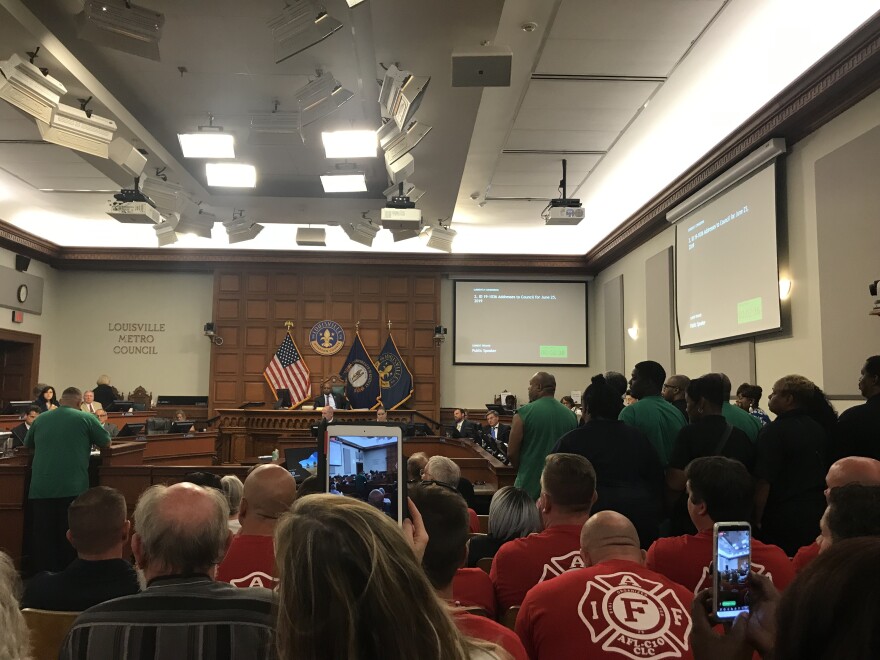Louisville Metro Council has voted to slash more than $25 million from the upcoming city budget to ward off rising pension costs.
The austerity cuts across city services, trimming department budgets, laying off city workers, decreasing funding for police and fire, limiting access to public pools and libraries, and turning control of the city’s Youth Detention Center over to the state.
Prior to the vote, Budget Council Chair Bill Hollander addressed the chamber packed with residents, police, firefighters, librarians and youth detention officers — all there to defend services they feel are vital to the city and its people.
These budget cuts mean there will be fewer police and firefighters on the streets, longer wait times for snow plowing and pot hole repairs, cuts to library services and no school resource officers, Hollander said. The budget also eliminates funding forthe Living Room Project, which supports adults in crisis.
“I think we have improved this budget, but I think it’s important to know there are deep cuts, people will be affected, not only who work for metro government, but who are served by those people,” Hollander said.
The Metro Council approved the city’s budget for the upcoming fiscal year beginning on July 1 on a 24 to one vote Tuesday night. Councilwoman Madonna Flood voted against the measure saying “Sometimes you have to stand and sometimes you have to stand alone.”
It now moves to Mayor Greg Fischer’s desk for a signature.
After the vote Tuesday, Fischer released a statement saying he appreciates the council maintained the vast majority of his proposed budget, but disagreed with the council’s decision to end youth detention services, keep the Middletown Library and increase neighborhood spending accounts for council members.
"While I disagree with these choices, my team will move forward, balance the budget and find ways to implement them with the least amount of pain to our residents,” Fischer said.
More Cuts Coming
Tuesday night’s vote signals Louisville’s first significant budget cut since the Great Recession with more reductions likely in the coming years as the city searches for ways to meet rising pension obligations.
Fischer first detailed the scope of the problem back in February, warning the price tag on rising pension and healthcare costs would amount to $65 million over the next four years. Rising pension obligations are the result of a 2017 decision from the Kentucky State Retirement Board, which changed its forecast for the underfunded pension system.
Fischer pursued hikes on the insurance premium tax to close the city’s funding gap, but a bi-partisan coalition of 15 Metro Council members voted against the measure, leaving city leaders clambering to make difficult decisions about where to trim the budget.
The Mayor’s proposed budget eliminated 88 city jobs, closed one fire station, removed an ambulance from service, and closed the city’s outdoor pools, among other cuts.
Last Thursday, the city’s budget committee revised that budget to redistribute some of the pain.
About $1.3 million in savings is expected to come from ending the city’s commitment with Youth Detention Services. State officials said the Department of Juvenile Justice does not have the resources to take over the operation and would likely disperse Louisville youth throughout the state.
About a dozen employees from youth detention services, dressed in green and black, attended the meeting to express disapproval over the cuts. Ahead of the vote, Ronnie Goforth pleaded with council members to go to Frankfort and renegotiate the terms of the contract with the state, rather than cut funding.
“But if you decide [the kids] are not worth the effort and something happens to these kids at the state camps, I hope you do not blame the mayor or anyone else, that you accept the responsibilities for putting these actions in motion,” Goforth said.
The projected savings from the shifting responsibility for the Youth Detention Center will be used in part to continue a $400,000 gunshot detection system known as ShotSpotter — though it could be used to cover other costs in Downtown and West End communities.
Cuts to other agencies including the Office of Safe and Healthy Neighborhoods and Economic Development will help preserve other services including current library hours and weekly recycling in the city.
The amended budget also includes funding to reopen the Sun Valley and Algonquin pools next summer and to reopen the Middletown Branch Library.
Both Hollander and Fischer warned residents of another round of cuts next year if the city doesn’t come up with another means to raise revenue, as pensions costs are expected to rise $10 million each year for the foreseeable future.
"With our pension costs continuing to increase over the coming years, more cuts will keep coming. I don’t like it, but that’s reality,” Fischer said in a statement. “I understand that many people do not want to raise taxes, but no one likes service cuts either. We must face the reality that we must have new revenue if we want to continue to pursue greatness for our city.”


